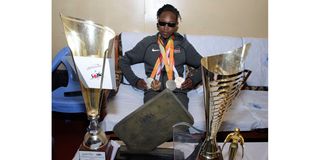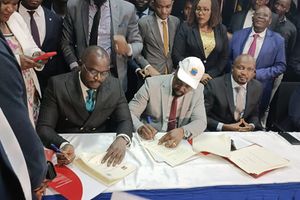Para athletes deserve recognition just like their Olympic mates

World Paralympic Champion, Nancy Chelangat, 25 displays some of her medals during the interview at their home in Kaliyet village, Kipkelion West in Kericho County on September 11, 2023.
What you need to know:
- Chelangat, who prefers to be called ‘Chela,’ was born blind, but you won’t be able to tell immediately, if you look at her achievements
- Chelangat won silver and bronze in the 2019 Paralympics, and gold in the World Championship in July this year
- An Olympic gold medal feels, weighs and looks the same way a Paralympic gold medal does
By the time you read this opinion, Mashujaa Day celebrations may be in top gear all across the country. At about midday at Kericho Green Stadium, the Head of State will call out names of a number of ‘Shujaas’ (notice the quotes) who have made the country proud in one way or the other.
Some of those awardees will be more deserving than others, as history has showed us, but if there is one person who deserves praise, flowers and the HSC title today, it is Kericho-born and bred Paralympian Nancy Chelangat Koech.
You may need to do a quick Google search to familiarise yourself with this name, but I assure you that when you do, you will agree with me that Chelangat is a Kenyan great who has been wronged in many ways. Her story is an elaborate confirmation that even today, 23 years into The New Millennium, we are still in the era of discrimination.
Chelangat, who prefers to be called ‘Chela,’ was born blind, but you won’t be able to tell immediately, if you look at her achievements. Chelangat is the first Kenyan athlete ever to return a medal from the Paralympics. This is a huge deal because the Paralympic games are the equivalent of the Olympics, but for disabled athletes. And you know that the Olympics competition is the pinnacle of sports achievement.
Chelangat won silver and bronze in the 2019 Paralympics, and gold in the World Championship in July this year. She holds 32 medals from various competitions, but the unlike other podium finishers and Olympians, Chelangat has never met the head of State, has never been accorded the privilege of a grand reception at the airport, has never been contacted or congratulated for her wins by any sports ministry official, not even those from her county, Kericho, and worse, her name is always missing when other world beaters are rewarded for their exploits.
Perhaps it is because she was born with a disability, and humanity just has a way of assuming that disability is an individual problem that those affected should overcome in order to fit into (thriving is too much to ask) society. Or maybe it is because she doesn’t possess the boisterous nature of able bodied athletes like Eliud Kipchoge and Faith Kipyegon, who bounce into the mixed zone for interviews hot and confident, and Chelangat has to be guided on, sometimes wearing spectacles so thick you can barely see her face. Or is it because she is a female athlete?
Whatever the case, we need to urgently move the conversations on disability from the boardrooms and conferences, and onto actual practice. We need to cast a bigger spotlight on Para sports. All athletes, whether able-bodied or disabled, should be supported full-heartedly in their pursuit of success, and rewarded equally when they achieve it. An Olympic gold medal feels, weighs and looks the same way a Paralympic gold medal does. Same goes for all other major trophies and medals.
This fine Friday, may we be reminded that athletes come in all shapes and sizes — tall, short, skinny, built, and… And disabled! Give Nancy her flowers, and pay more attention to differently abled champions. They are victors too!




